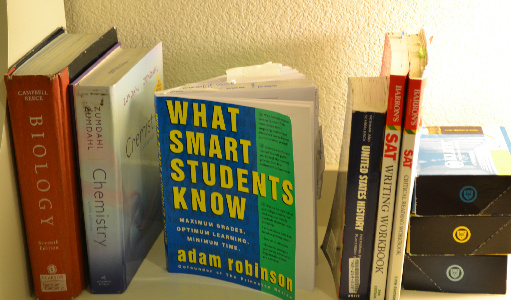
Asian parents are known to do it and a few have even earned national notoriety doing it: throwing children into the deep end. By no means is this a reference to vexed parents drowning their children, but rather to uptight parents, like Amy Chua, strictly disciplining children and enforcing the “I don’t take crap” rule in their households.
Chua, who has made national news with her Wall Street Journal article on Asian parenting, and other parents who struggle with getting their teen motivated, need not fear for the future of their child any longer. Adam Robinson’s book, “What Smart Students Know”, starts out by throwing its readers, consisting mostly of students in need of study tips and motivation, into the deep end.
In the first chapter titled “Throwing You in the Deep End”, Robinson begins by dissecting a geology passage using techniques high-achieving students would use to get to the core of the text. He then goes on to reveal the critical difference between smart students and their classmates—attitude.
Robinson recognizes the fact that grades are a direct reflection of the attitude and lifestyle of a student, rather than their actual capabilities. With this in mind, he includes several attitude inventories throughout the book, giving readers insights into their own character.
Students have also revealed that Robinson’s relaxed tone makes his book much more relatable and “hip.”
“You can tell he knows what he’s saying and he understands kids,” says Jennifer Pham, a freshman at Scripps Ranch High School. “He seems laid-back and hip. He knows his audience.”
Making it through roughly 270 pages of instruction is where students are put to the ultimate test of survival. After numerous pages of “smart” talk, enduring a 20-page biology passage is the least of one’s concerns.
Robinson’s practical tips are meant to ease the studying and stress involved in high school and college course loads. Although no book can serve as the remedy to success for every student out there, insight from a man with degrees from Wharton and Oxford can surely be put to some use. Through his book, Robinson offers his helping hand in allowing students to take control of their own learning and education.
Jeffrey Chen, a freshman at Scripps Ranch High School, points out that Robinson’s book is more than just a story filled with lessons on how to study. “It truly is a book of philosophy. It’s not a list of rules you have to follow, but a book that the reader has to interpret with their own understanding. It’s all about incorporating Robinson’s tips into your own lifestyle and studies.”

